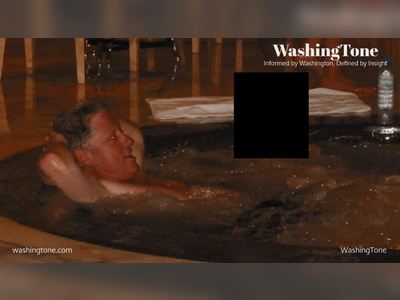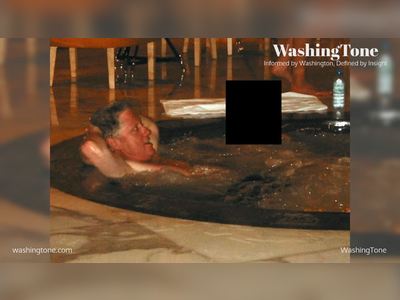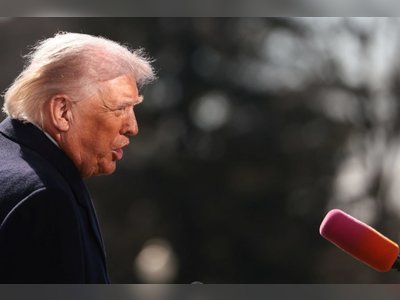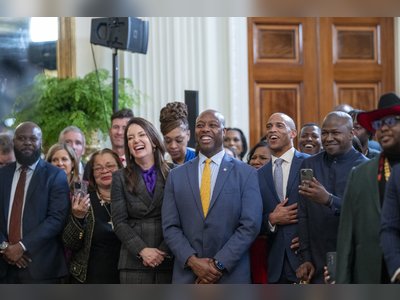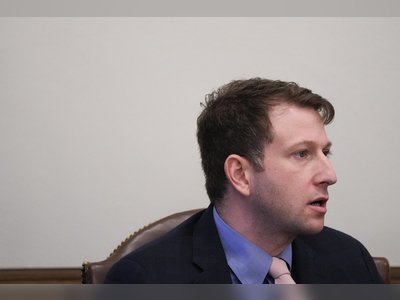White HouseSenateThe HouseSupreme CourtFederal ReserveDOJState DepartmentTreasuryCensusBudget OfficeTrade Representative
WashingTone
Informed by Washington, Defined by Insight
Monday, Mar 02, 2026
WashingTone

U.S. Treasury Unveils Proposed Rules for Qualified Commercial Clean Vehicle Credit
New regulations aim to boost clean vehicle adoption, reduce transportation costs, and enhance energy security, as part of the Biden-Harris Administration's climate agenda.
WASHINGTON – In a major step toward advancing the United States' clean energy goals, the U.S. Department of the Treasury, in conjunction with the Internal Revenue Service (IRS), has unveiled a Notice of Proposed Rulemaking (NPRM) on the Qualified Commercial Clean Vehicle Credit (45W).
This initiative, introduced as part of the Biden-Harris Administration’s Inflation Reduction Act, is designed to incentivize the adoption of commercial clean vehicles, thereby reducing transportation costs, boosting domestic auto manufacturing, and enhancing U.S. energy security.
A Strategic Step Toward a Clean Energy Future
The Qualified Commercial Clean Vehicle Credit offers financial incentives for businesses purchasing and using clean vehicles, such as battery electric vehicles (BEVs), plug-in hybrid electric vehicles (PHEVs), fuel cell electric vehicles (FCEVs), and plug-in hybrid fuel cell electric vehicles (PHFCEVs).
This incentive is calculated based on either 30% of the vehicle’s purchase price (15% for PHEVs) or the incremental cost of a clean vehicle compared to a gasoline or diesel-powered equivalent.
Businesses can claim up to $7,500 for light-duty vehicles (under 14,000 pounds Gross Vehicle Weight Rating, GVWR), and up to $40,000 for larger vehicles like electric buses and semi-trucks (GVWR of 14,000 pounds or more).
The proposed credit seeks to incentivize the use of clean vehicles across various industries, with the ultimate aim of lowering emissions and fostering a transition to more sustainable transportation solutions.
Deputy Secretary of the Treasury, Wally Adeyemo, expressed optimism about the rules, stating that the new guidance will encourage investment in the clean vehicle sector, helping to secure the nation’s energy future.
Key Provisions of the NPRM
The NPRM lays out a series of guidelines to ensure that the credit is properly implemented and accessed by eligible commercial entities.
Among the most notable provisions are:
Determining Credit Amount: The NPRM introduces various pathways for determining the incremental cost of a commercial clean vehicle.
Businesses can either use safe harbors set by previous notices or calculate the incremental cost by comparing the price difference between clean vehicles and their internal combustion engine (ICE) counterparts.
This flexibility aims to streamline the application process for businesses seeking to utilize the credit.
Clarification of Eligibility Requirements: The proposed rules define which types of vehicles qualify for the credit and offer further clarification on eligibility criteria.
Notably, only vehicles used 100% for trade or business purposes are eligible, with minor exceptions for de minimis personal use.
Additionally, vehicles that have already been claimed under other clean vehicle credits, such as the 30D or 45W, will not be eligible for this specific incentive.
Off-Road Mobile Machinery: A significant point of discussion within the NPRM pertains to off-road mobile machinery.
While the proposal does not yet finalize a decision, Treasury is seeking public input on whether to establish a product identification system for off-road vehicles, such as electric construction equipment, that would comply with statutory requirements for the credit.
These proposed rules represent a critical step in ensuring that businesses have a clear path to accessing incentives that will help drive the shift toward electric and other low-emission vehicles.
By clarifying how the credit works and who is eligible, Treasury aims to promote broader adoption and streamline the process for companies seeking to capitalize on these benefits.
The Road Ahead: Public Comments and Public Hearing
The Treasury Department is encouraging public feedback on these proposed rules for a 60-day period, allowing stakeholders to submit comments on the NPRM.
A public hearing is scheduled for April 28, 2025, where Treasury officials will listen to further input on how best to structure the program and address any concerns raised by the business community.
This engagement reflects the Biden-Harris Administration’s commitment to an inclusive approach in shaping policies that impact the transition to a clean energy future.
By seeking input from a wide range of stakeholders, the government is ensuring that the implementation of the credit meets the needs of businesses while advancing the broader goals of reducing carbon emissions and strengthening energy independence.
Potential Impacts on U.S. Industry and Energy Security
The Qualified Commercial Clean Vehicle Credit holds significant potential for U.S. industries.
The financial incentives could lower the operational costs of businesses in sectors such as transportation, logistics, and manufacturing, making it easier for them to transition to clean vehicle fleets.
As businesses adopt cleaner technologies, they will contribute to reducing emissions, particularly in industries where fossil fuel consumption has been historically high.
Additionally, by strengthening domestic clean vehicle manufacturing, the policy has the potential to boost U.S. jobs in the manufacturing sector, create new business opportunities, and reduce the country’s dependence on foreign oil, ultimately enhancing national energy security.
However, some stakeholders have expressed concerns about the long-term feasibility and scale of the program.
Critics argue that the upfront costs associated with transitioning fleets to electric or hybrid vehicles may still be prohibitive for smaller businesses, and the transition may be too gradual without more immediate incentives.
Conversely, supporters argue that, with the right clarity in the rulemaking process, these incentives will effectively jumpstart clean vehicle adoption at scale.
Conclusion: Aligning Policy with Climate Goals
The U.S. Treasury’s proposed rules for the Qualified Commercial Clean Vehicle Credit represent a significant effort to align federal policy with climate goals by reducing emissions from one of the largest sources of pollution: transportation.
By targeting the commercial sector, where fleet vehicles play a central role in carbon output, the Biden-Harris Administration aims to foster a transition toward a more sustainable economy while creating new opportunities in manufacturing and energy security.
The proposed credit is just one piece of a broader effort to reduce greenhouse gas emissions and shift the U.S. toward a cleaner, more resilient energy future.
As the public comment period progresses and the final rules are implemented, businesses, policymakers, and consumers alike will be closely watching the impact of this credit in achieving those ambitious goals.
This initiative, introduced as part of the Biden-Harris Administration’s Inflation Reduction Act, is designed to incentivize the adoption of commercial clean vehicles, thereby reducing transportation costs, boosting domestic auto manufacturing, and enhancing U.S. energy security.
A Strategic Step Toward a Clean Energy Future
The Qualified Commercial Clean Vehicle Credit offers financial incentives for businesses purchasing and using clean vehicles, such as battery electric vehicles (BEVs), plug-in hybrid electric vehicles (PHEVs), fuel cell electric vehicles (FCEVs), and plug-in hybrid fuel cell electric vehicles (PHFCEVs).
This incentive is calculated based on either 30% of the vehicle’s purchase price (15% for PHEVs) or the incremental cost of a clean vehicle compared to a gasoline or diesel-powered equivalent.
Businesses can claim up to $7,500 for light-duty vehicles (under 14,000 pounds Gross Vehicle Weight Rating, GVWR), and up to $40,000 for larger vehicles like electric buses and semi-trucks (GVWR of 14,000 pounds or more).
The proposed credit seeks to incentivize the use of clean vehicles across various industries, with the ultimate aim of lowering emissions and fostering a transition to more sustainable transportation solutions.
Deputy Secretary of the Treasury, Wally Adeyemo, expressed optimism about the rules, stating that the new guidance will encourage investment in the clean vehicle sector, helping to secure the nation’s energy future.
Key Provisions of the NPRM
The NPRM lays out a series of guidelines to ensure that the credit is properly implemented and accessed by eligible commercial entities.
Among the most notable provisions are:
Determining Credit Amount: The NPRM introduces various pathways for determining the incremental cost of a commercial clean vehicle.
Businesses can either use safe harbors set by previous notices or calculate the incremental cost by comparing the price difference between clean vehicles and their internal combustion engine (ICE) counterparts.
This flexibility aims to streamline the application process for businesses seeking to utilize the credit.
Clarification of Eligibility Requirements: The proposed rules define which types of vehicles qualify for the credit and offer further clarification on eligibility criteria.
Notably, only vehicles used 100% for trade or business purposes are eligible, with minor exceptions for de minimis personal use.
Additionally, vehicles that have already been claimed under other clean vehicle credits, such as the 30D or 45W, will not be eligible for this specific incentive.
Off-Road Mobile Machinery: A significant point of discussion within the NPRM pertains to off-road mobile machinery.
While the proposal does not yet finalize a decision, Treasury is seeking public input on whether to establish a product identification system for off-road vehicles, such as electric construction equipment, that would comply with statutory requirements for the credit.
These proposed rules represent a critical step in ensuring that businesses have a clear path to accessing incentives that will help drive the shift toward electric and other low-emission vehicles.
By clarifying how the credit works and who is eligible, Treasury aims to promote broader adoption and streamline the process for companies seeking to capitalize on these benefits.
The Road Ahead: Public Comments and Public Hearing
The Treasury Department is encouraging public feedback on these proposed rules for a 60-day period, allowing stakeholders to submit comments on the NPRM.
A public hearing is scheduled for April 28, 2025, where Treasury officials will listen to further input on how best to structure the program and address any concerns raised by the business community.
This engagement reflects the Biden-Harris Administration’s commitment to an inclusive approach in shaping policies that impact the transition to a clean energy future.
By seeking input from a wide range of stakeholders, the government is ensuring that the implementation of the credit meets the needs of businesses while advancing the broader goals of reducing carbon emissions and strengthening energy independence.
Potential Impacts on U.S. Industry and Energy Security
The Qualified Commercial Clean Vehicle Credit holds significant potential for U.S. industries.
The financial incentives could lower the operational costs of businesses in sectors such as transportation, logistics, and manufacturing, making it easier for them to transition to clean vehicle fleets.
As businesses adopt cleaner technologies, they will contribute to reducing emissions, particularly in industries where fossil fuel consumption has been historically high.
Additionally, by strengthening domestic clean vehicle manufacturing, the policy has the potential to boost U.S. jobs in the manufacturing sector, create new business opportunities, and reduce the country’s dependence on foreign oil, ultimately enhancing national energy security.
However, some stakeholders have expressed concerns about the long-term feasibility and scale of the program.
Critics argue that the upfront costs associated with transitioning fleets to electric or hybrid vehicles may still be prohibitive for smaller businesses, and the transition may be too gradual without more immediate incentives.
Conversely, supporters argue that, with the right clarity in the rulemaking process, these incentives will effectively jumpstart clean vehicle adoption at scale.
Conclusion: Aligning Policy with Climate Goals
The U.S. Treasury’s proposed rules for the Qualified Commercial Clean Vehicle Credit represent a significant effort to align federal policy with climate goals by reducing emissions from one of the largest sources of pollution: transportation.
By targeting the commercial sector, where fleet vehicles play a central role in carbon output, the Biden-Harris Administration aims to foster a transition toward a more sustainable economy while creating new opportunities in manufacturing and energy security.
The proposed credit is just one piece of a broader effort to reduce greenhouse gas emissions and shift the U.S. toward a cleaner, more resilient energy future.
As the public comment period progresses and the final rules are implemented, businesses, policymakers, and consumers alike will be closely watching the impact of this credit in achieving those ambitious goals.





